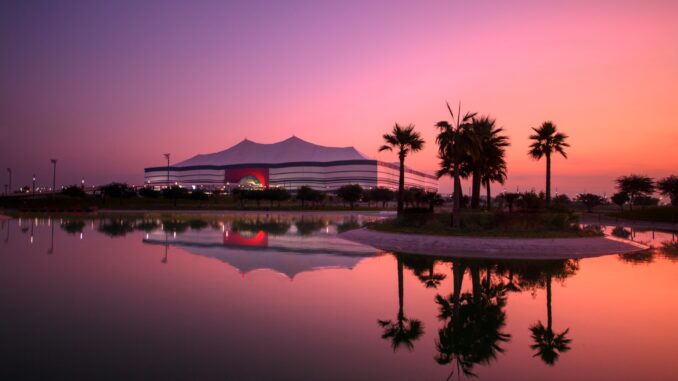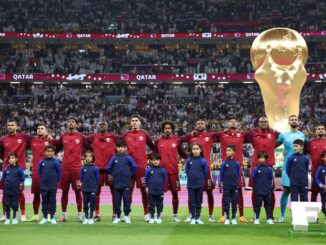
As the sun rises over Doha’s glorious West Bay to signal the start of the 18th AFC Asian Cup, so does the sun also begin to set on Qatar’s time in the spotlight of international football.
Ever since then FIFA president Sepp Blatter pulled the name of the tiny Gulf state out of an envelope in Zurich back in 2010, announcing it as the surprise host of the 2022 FIFA World Cup, Qatar has been in the football spotlight.
If Qatar wanted global attention, they certainly got it – good and bad. The country’s human rights record, apparent lack of football history or culture, its treatment of women and the LGBTQI+ communities; it seemed anything anything and everything was fair game when it came to Qatar.
Hosting the AFC Asian Cup in 2011 was the first step on a long road that would see Qatar’s power and influence within the football world grow to levels never before seen in this part of the world.
While the downfall of Mohammed bin Hammam lost it a powerful figure inside the corridors of FIFA, It’s purchase of Paris Saint Germain, and the rise in status of its chairman, Nasser Al-Khelaifi, meant Qatar had a powerful voice within the halls of power of European football, extending its influence far beyond just hosting an international football tournament.
For over a decade the world fixed its gaze on the country as it poured billions of dollars into ensuring the country was ready when the world descended upon it in November and December of 2022.
Its tentacles also spread to within the corridors of Asian football as well.
Before his unfortunate passing, Qatar Football Association vice-president, Saoud bin Abdulaziz Al Mohannadi, who also served as the vice-president of the Asian Football Confederation, was a powerful figure in the political game that is Asian football.
Qatar was also a savior for the AFC on more than one occasion. Firstly stepping in, when no one else would, to host the conclusion of the 2020 AFC Champions League after the COVID-19 pandemic wreaked havoc across the continent.
Secondly, after China was forced to withdraw from hosting the 2023 AFC Asian Cup as a result of its own strict COVID measures, Qatar was once again ready, willing and able to step in at short notice to stage the event, which brings us to where we are right now.
It has, undoubtedly, been the decade of Qatar.
But that is now all changing. As the country still comes down from the high of hosting the FIFA World Cup, the balance of power within Asia has well and truly shifted, albeit only about 600 kilometres west to Saudi Arabia.
Already confirmed as host of the 2027 AFC Asian Cup, and all but confirmed as host of the 2034 FIFA World Cup, the Kingdom will also host the 2034 Asian Games and is bidding to host the AFC Women’s Asian Cup, either in 2026 or 2029.
As Qatar turns its attention elsewhere, seemingly away from football, and with the decade of Saudi Arabia already underway, the Asian Cup feels a little lost in the transition.
But that doesn’t make it any less important. In fact, it’s perhaps the opposite.
“If you look at it, it’s definitely important for Qatar to build on the World Cup,” Qatari football journalist, Ahmed Hashim, told The Asian Game Podcast.
“To show that there is a legacy for the World Cup, in terms of both an increased interest in football, and also the use of the stadiums after World Cup. It’s important in that way, but also, it’s also important for football.
“It’s important for the national team to show that the 2019 year was not a flash in the pan. To show that they still have quality in them that this is footballing nation, and that the World Cup was a setback, but it’s something that they can rise up from.”
Rather than being the full stop on the story of Qatar, Hashim believes this Asian Cup should serve as the end of the beginning, rather than the beginning of the end, heralding a new dawn in Qatari football.
“So this is one final opportunity, I would say for Qatar as a country. It’s like the final act before everything moves to Saudi Arabia, and the spotlight moves on to Saudi Arabia for the next five or ten years.
“We’ve been enjoying that spotlight for the last decade, and this is the final act, this is the opportunity to show that we still have what it takes.
“It might be the last opportunity, because I don’t think we’re going to be hosting a tournament of this size again for quite some time.
“We can use this as the beginning of a new era, away from the spotlight, and a new era in which we should look to qualify for the World Cup comfortably for the first time, not as host, and make that a regular thing.
“So I think in that way, this Asian Cup is important.”
Thirteen years on from its last hosting of the Asian Cup, so much has changed in Qatar. That much is obvious, from the stadiums to the infrastructure to its standing, both as a global citizen and within football.
It feels, in some ways, an entirely different country to when the Asian Cup was last here.
The next month, in many ways the bookend to this decade of Qatar, will tell us exactly how much has changed.
Listen to The Asian Game Podcast as we preview the AFC Asian Cup 2023:




